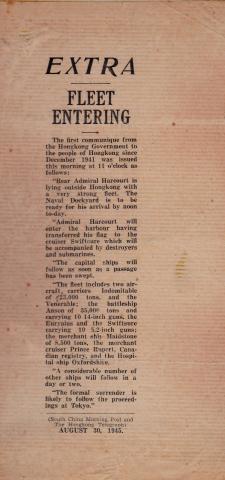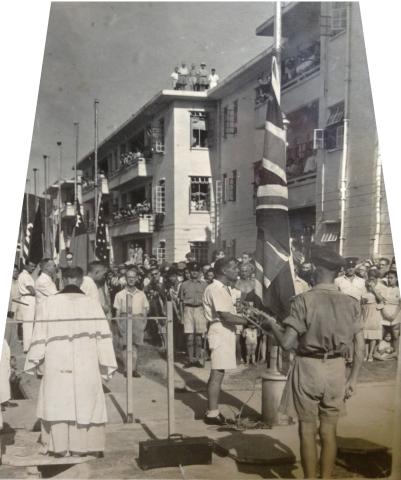Dawn, 30th August.—At first light the minesweepers are off, creeping through the morning mist ; they swing seaward and then head north for the harbour entrance. The Maidstone follows slowly, her guns trained steadily on the green slopes, where we know the Japanese have a battery of 9-in. guns. We go slow ahead. Meanwhile the sun rises gaudily and the day begins to heat up. The topmasts of the Task Group appear over the horizon as they close for the day’s work. We can recognise them now— the aircraft carrier Indomitable, the cruisers Swiftsure and Euryalus, and a screen of destroyers led by the Kempenfelt. Farther to the south the great bulk of the battleship Anson creeps into view.
A mile off the boom we anchor. The sweepers pass on, then swing back to clear a wider channel for the approaching fleet. Aircraft from one of the carriers fly over. We hear that they are dropping supplies on the prisoner-of-war camps.
It is a glorious day, with blue sea and crystal-clear visibility. The green hills seem almost to sparkle. The white sails of the junks pass and repass, indifferent to the currents of war and peace. A small land-bird comes uncertainly aboard and peers down at us from the rigging.
While the fleet forms up to seaward of us a sampan is seen approaching, with a tall figure standing in the stern waving furiously. A launch dashes off to investigate, and returns with one of the prisoners from the internment camp. From him we hear our first news of the colony. It seems that the Japanese have been reasonable for some days and are pulling out where possible. The civilian internees are out and about; they have a provisional government trying to straighten things out, but the enemy are still on the island in force. It appears that the Hong Kong police are on duty once more, and that the Chinese have formed an auxiliary force of some sort. The Japanese are working entirely in their own interests, since they know that they will be much better off with the British in control. If the Chinese took things into their own hands, there would be a lot of blood flowing over those green hills.
While we talk, a squadron of fighters goes over and the leading destroyer steams slowly into the channel. Battle flags break out at her masthead. Things are on the move.
Admiral Harcourt passes in the Swiftsure, followed by the Euryalus and Prince Robert. We weigh anchor and follow up the narrow channel.
The first impression is of ruin and disorder. The American bombs are no doubt responsible for many of the wrecks ; they may have caused those tortured heaps of concrete and steel in.the dockyard, but what of the roofless houses on the hillside ? Everywhere there is an atmosphere of defeat.
The beauty of the place remains ; it strikes a happy note above the many details of desolation. Whatever the condition of the houses, the white walls still glint in the sunlight. The water of the harbour is as blue as ever; and the sails of the junks may be tattered, but they dance before our eyes, little white squares, as far as we can see.
We swing past the anchored cruisers towards the mole at which we are to berth. Landing-parties from the other ships are already speeding ashore, and our own men stand, ungainly in their equipment, ready to clear our allotted part of the dockyard. Over Admiralty House the Japanese Rising Sun folds and unfolds its brilliant red and white. A Japanese destroyer lies alongside the stone quay; her crew stand idly watching us approach.
In spite of the tension and the gleaming, blue barrels of the tommy-guns, the whole place has a Sunday afternoon tempo. There is no hurry; there is a peaceful, easy-going manner about the British ships as they swing gracefully to the tide. The Japanese, for their part, lounge in bored resignation. If they intend to try any tricks they are leaving it very late.
As we come alongside the vista opens up. Across the shattered mole, in the small basin, the rusted funnel of a merchant ship rises unhappily from the water. Tugs, motor-launches, and small submarine-chasers lie alongside each other in profusion. Not one of them seems to be in any state of repair; they are like dead ships, idly waiting for their own particular judgment day. The mole itself is a shambles, and so, it seems, is the rest of the dockyard. Twisted cranes, great slabs of steel, shattered boats lie around haphazard. It is difficult to believe that the Japanese intended to occupy Hong Kong indefinitely.
Now we are tied up and the gangway is down. Steel-helmeted sailors walk from place to place, prodding, searching in holes and corners. From somewhere in the dockyard comes the sharp crack of rifles and the chatter of submachine guns. We learn that a few ‘death and glory’ snipers are still holding out. A grenade explodes and the harsh chatter of fire flares up momentarily, then all is quiet. From our main-deck we can see our men running past danger-points. The welldirected scene from Hollywood unfolds swiftly.
From the little white mast over the dockyard signal station the White Ensign flutters uncertainly for a moment, then streams out in the hot wind. Sunday afternoon once more.
Ashore, every step over the rubble is taken carefully. In one of the sheds on the mole we find a room where the Japanese have quartered some men. Confusion and squalor. We open doors and lockers with long broomhandles, but the precaution is unnecessary. The residents have departed too quickly to set booby-traps. They have left most of their own personal gear, and, we find, a great deal of the stuff is British or American. The amount of British signal-pads is especially noticeable. In one small box are the untouched possessions of a British naval rating which have, presumably, been lying there for the last four years.
Six hundred Japanese naval officers and ratings are captured in the dockyard; they sit apathetically in the hot sun watching the dark barrels of the rifles that wave in the practised hands of the Royal Marine guard. Some look around with interest, but the majority sulk at high pressure. No doubt the Emperor will have something to say to them when they get home.
Hong Kong was not used by the Japanese as a major base. It had recently become a backwater. This was almost certainly due to the efficient sea and land blockade flung out by the Americans, but, even taking this into account, the general state of the Japanese ships is incredible.
The submarine-chasers are wooden built, diesel-engined, and of about two hundred tons. As far as armament goes they are well off, and the guns seem to be well looked after. In the living quarters, however, there is sordid squalor. Untidiness and filth are the general rule. Bottles of apple wine and beer lie around, some half full. The paintwork is shabby; it flakes off at the first touch, leaving a bareness of rust or soot. The ropes are fifth-rate. Perhaps it is in this poor living and obvious lack of essential materials that these men first saw defeat.
As the day unfolds the scene becomes clearer. No Japanese remain free in the dockyard. The area is divided into sectors, and one ship is made responsible for the clearance and smooth running of each sector. The work starts at once. The submarines slide gingerly into the basin; their crews also have been allotted various buildings to put in order. Outside the dockyard the situation is obscure. The Rising Sun still flutters from Admiralty House. We have about three hundred armed sailors and marines ashore in the dockyard: the Japanese have up to four thousand men in the town outside. In these circumstances the Admiral has, apparently, decided to bite only what he can chew, and there are many days’ chewing in the dockyard alone.
Our own particular mole was once graced by a rail track. Now the inner arm slumps wearily into the water, and our jeeps are unable to plough their way into the main part of the dockyard. One of us finds a harassed officer in charge of the Japanese and borrows thirty of the sulkiest for a working party. As their efforts begin to show results they become interested ; the road takes shape slowly. They work out their own plan of reconstruction, forming long chains to pass bricks and rubble for the holes and trotting off to collect barrows of sand. Only a fat and double-chinned Petty Officer is disinclined to co-operate. An occasional prick from the guard’s bayonet persuades him that the surrender is, as far as we are concerned, still unconditional.
These Japanese can be divided into three distinct types. There are the small, smooth-haired, spectacled ones whom we call the Hirohito class. They are not much good for work. Secondly, there is the tougher, happier breed ; these men take things as they come and seem quite happy to do their bit as long as they are led by the hand. We put them in the peasant category. The third lot are blatantly unpleasant. I imagine they have always been unpleasant, even before the war. They are obviously double-faced, sly, arrogant, and proud. We have to prick them pretty often. The Japanese officers are in a class of their own. Their features are more regular and their smiles rather less extensive than in Low’s cartoons of Togo. Nevertheless, in their plausible graciousness, they are probably the most dangerous of the lot.
We worked those men till sunset. They marched away in their heavy boots, a shuffling rabble of poorly dressed, poorly fed humanity. Beside them, in spotless whites, marched a six-foot sentry of the decadent West.
Night.—The Sunday atmosphere has been dispelled by darkness. The hills are black against the stars, black and very silent. The lights of the fleet shine in quivering lines over the water. Searchlights swing ceaselessly; they move regularly, pausing here and there on a junk. Motor-launches move, their engines going slow, circling the ships, intercepting any craft that seems suspicious. Sometimes, from the deep shadows of the town, comes a sharp crack. The snipers are still out.
The blue beam of a single searchlight swings over the hills, quickly turning the dark mass into relief, revealing the houses and roads to the searching eyes of the security patrols. A launch brings in some Japanese army men who have tried to slip away to the mainland. So the night goes on.
There is a certain amount of disorder outside the dockyard gates. The Chinese take the opportunity to beat a few Japanese to death, hauling them off the trams and smacking at their heads with hammers. Some collaborators are treated in the same way. One woman is stripped; she seeks refuge behind our stolid guard. On the whole, however, this is a very localised show of revenge or what will you: the greater part of the island is quiet.

